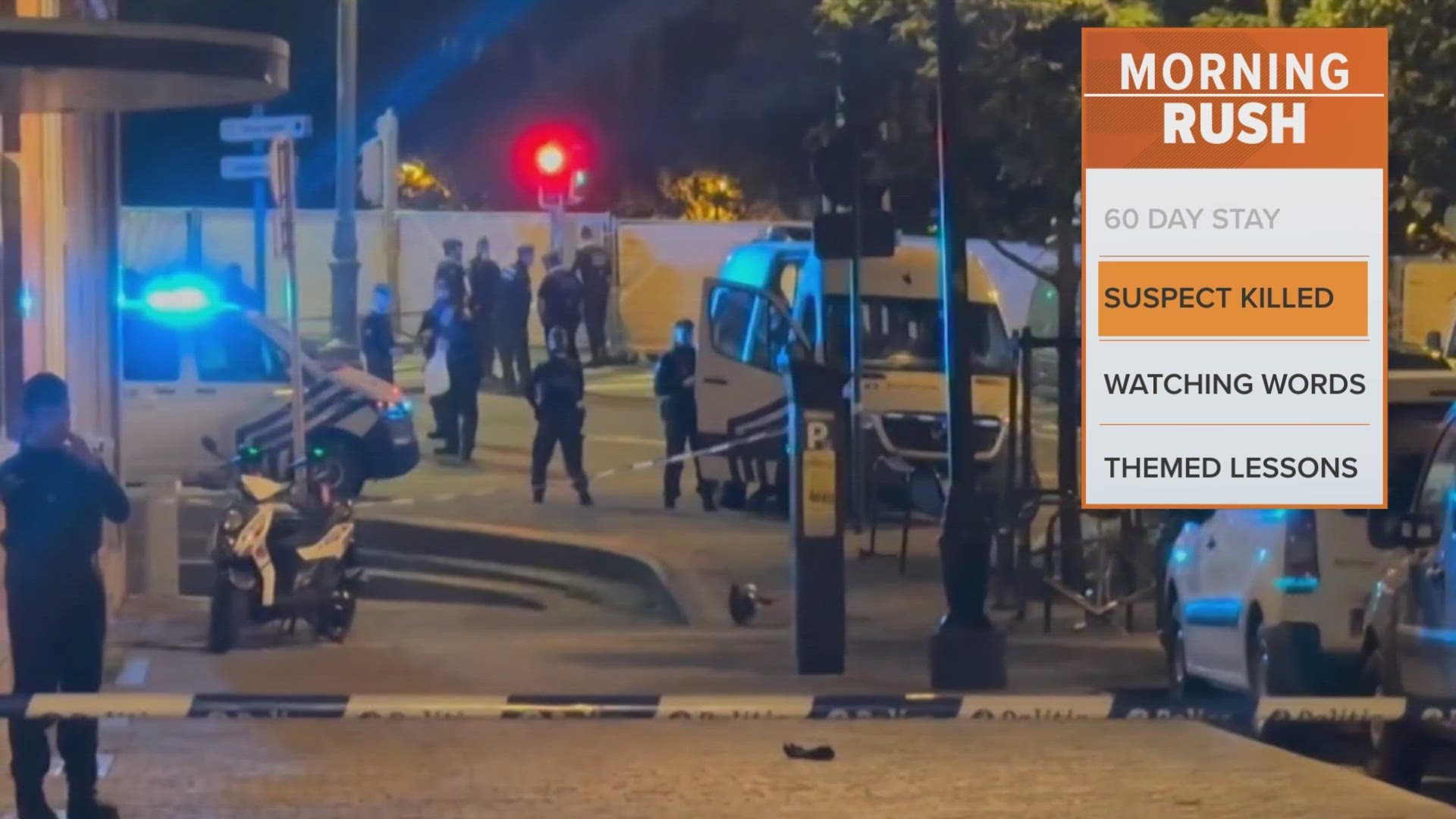BRUSSELS, Belgium — Police in Belgium on Tuesday shot dead a suspected Tunisian extremist accused of killing two Swedish soccer fans in a brazen shooting on a Brussels street before disappearing into the night.
Hours after a manhunt began in the Belgian capital, Interior Minister Annelies Verlinden posted on X, formerly Twitter, that “the perpetrator of the terrorist attack in Brussels has been identified and has died.”
She thanked Belgium's intelligence and security services, as well as the public prosecutor’s office, "for their swift and decisive action last night and this morning.” The man was shot by police in the Schaerbeek neighborhood near where the rampage took place. The weapon used in the assault was recovered.
Amateur videos posted on social media of Monday’s attack showed a man wearing an orange fluorescent vest pulling up on a scooter, taking out a large weapon and opening fire on people getting out of a taxi before chasing them into a building to gun them down. He was also filmed calmly loading his weapon as cars drove slowly by.
Questions remain unanswered over how a man who was on police files, thought to be radicalized and being sought for deportation was able to obtain a military weapon and launch such an attack.
“Last night, three people left for what was supposed to be a wonderful soccer party. Two of them lost their lives in a brutal terrorist attack,” Prime Minister Alexander De Croo said at a news conference just before dawn. “Their lives were cut short in full flight, cut down by extreme brutality.”
De Croo said his thoughts were with the victims’ families and that he had sent his condolences to the Swedish prime minister. Security has been beefed up in the capital, particularly around places linked to the Swedish community in the city.
“The attack that was launched yesterday was committed with total cowardice,” De Croo said.
Not far from the scene of the shooting, the Belgium-Sweden soccer match in the Belgian national stadium was suspended at halftime and the 35,000 fans were kept inside as a precaution while the attacker was at large.
“Frustrated, confused, scared. I think everyone was quite scared,” said Caroline Lochs, a fan from Antwerp.
At a news conference in Stockholm, Swedish Prime Minister Ulf Kristersson said that “everything indicates this is a terrorist attack against Sweden and Swedish citizens, just because they are Swedish.” He said the suspect had occasionally stayed in Sweden but was not on police files there.
“It’s not an unusual pattern to move around,” Kristersson added. “We have an openness in Europe, which is one of the important reasons why we need to keep an eye on the EU’s external border because otherwise people can easily move between European countries.”
De Croo said the assailant was a Tunisian man living illegally in Belgium who used a military weapon to kill the two Swedes and shoot a third, who is being treated for ”severe injuries."
Federal prosecutors said later that the suspect was found after a witness claimed to have spotted him in a Schaerbeek cafe. Police arrived at the scene and the suspect was shot as they tried to arrest him. First responders attempted to save the man, but he later died in hospital.
“A military weapon and a bag of clothes were found,” a statement said.
Federal Prosecutor Frederic Van Leeuw described how the suspect, a 45-year-old man who wasn't identified, had posted a video online claiming to have killed three Swedish people.
The suspect is alleged to have said in the video that, for him, the Quran is “a red line for which he is ready to sacrifice himself.”
Sweden raised its terror alert to the second-highest level in August after a series of public Quran burnings by an Iraqi refugee living in Sweden resulted in threats from Islamic militant groups.
Belgian prosecutors said overnight that nothing suggested the attack was linked to the war between Israel and Hamas.
According to Justice Minister Vincent Van Quickenborne, the suspect was denied asylum in 2019. He was known to police and had been suspected of involvement of human trafficking, living illegally in Belgium and of being a risk to state security.
Information provided to the Belgian authorities by an unidentified foreign government suggested that the man had been radicalized and intended to travel abroad to fight in a holy war. But the Belgian authorities were not able to establish this, so he was never listed as dangerous.
The man was also suspected of threatening a person in an asylum center and a hearing on that incident had been due to take place on Tuesday, Van Quickenborne said.
Belgian Asylum State Secretary Nicole de Moor said the man disappeared after his asylum application was refused so the authorities were unable to locate him to organize his deportation.
A terror alert for Brussels was raised overnight to 4, the top of Belgian's scale, indicating an extremely serious threat. It previously stood at 2, which means the threat was average. The alert level for the rest of the country was raised to 3.
___
Associated Press writer Samuel Petrequin and Karl Ritter in Stockholm contributed to this report.

